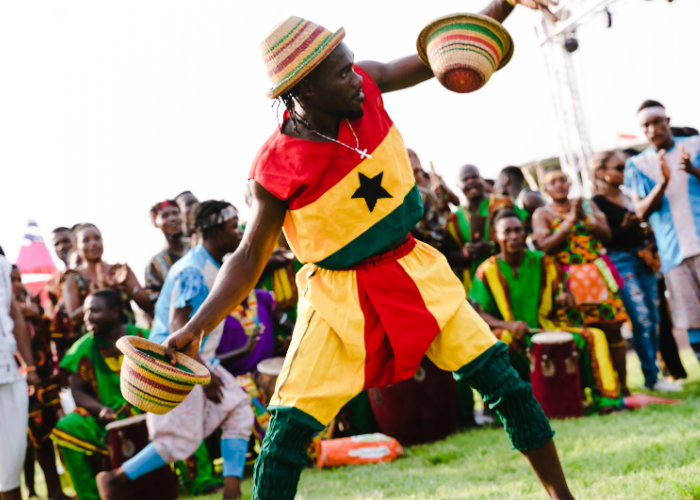Previously known as the Gold Coast, Ghana is a tourist destination with much to offer. It has a rich culture and history, a high quality of life, an affordable cost of living, beautiful landscapes, and lots of fun activities and attractions to indulge in.
The country was named the 11th friendliest in the world in 2011, so you can expect a pleasant experience surrounded by friendly and hospitable locals. Many visitors like the country so much that they’ve settled down in the country for good.
This Ghana travel guide will help you experience the country fully.
What To Do in Ghana
Here are some fun and educational things to do during your stay here:
Check Out What’s Happening at Oxford Street
Located in the Osu Neighborhood, this vibrant and fast-paced venue allows you to get acquainted with the country. It is named after the famous Oxford Street in London due to its exciting nightly activities.
From restaurants, fast food giants, vendors, and grocery stores to internet cafes and banks, Oxford Street has everything you could need and want.
Enjoy Good Food and Fantastic Views at Sky Bar 25
Skybar 25 is a rooftop restaurant and bar located in Alto Tower, one of the tallest buildings in Ghana. Reserve a table to tantalize your senses with innovative dishes, drinks, and desserts, served by an outstanding staff. As you feast, enjoy live music and brilliant views of the city.
But be prepared to shell out a pretty penny—it’s a premier location, after all!
Explore the Dark History of Cape Coast Castle
Cape Coast Castle was once among the 40 “slave castles” in the country. The UNESCO World Heritage Site has a guided tour that takes you through a collection of art and cultural objects while offering insights into the most lucrative commerce at that time—the slave trade.
You can also explore its dark dungeons to witness firsthand the contrasting lives of slaves and colonizers.
Admire Batik Fabric from Auntie Esther’s Shop
Ghana is known for its rich and colorful textile traditions. Experience them by visiting Exmac Fabrics. The shop is run by Austie Esther, also known as “Auntie Ocloo.”
You can get traditional batik fabric with intricate designs and go on a fabric tour with an expert. They’ll take you through the process of producing the hand-made fabric and let you choose the dye and designs you want!
See the Black Star Gate
The Black Star Square, also known as the Independence Square, is a must-visit tourist attraction for history and culture enthusiasts.
Commissioned by the founding leader Kwame Nkrumah, this symbol of independence is one of the largest city squares in the world. It also hosts the annual Independence Day celebrations. If you go there on March 6, you can fully experience its lively energy.
Spend a Weekend in Aburi
Aburi, a town northeast of Accra, is quickly becoming popular with the ultra-wealthy. The mountainous region is a good place to get your bearings and restore your energies due to its lush environment, fresh air, pleasant climate, and great lodging.
While there, visit the Aburi Botanical Gardens. It plays an important role in preserving rare plants and encouraging cocoa production.
Take a Walk Around Jamestown
Jamestown is one of the oldest districts in Accra. Walk through this densely populated fishing community and check out the street art on its buildings. Explore sites like Ussher Fort, Fort James, and Jamestown Lighthouse to learn more about colonial history.
Don’t forget to visit the Makola Market where you can find Ghanaian fare without any meat or fish—perfect for vegetarians!
Tour the W.E.B. DuBois Center
The W. E. B. DuBois Centre for the Pan-Africanist civil rights activist is a treasure trove of knowledge away from the busy city of Accra.
Discover the history of the Gold Coast, the tenets of Pan Africanism, memorabilia, and William Edward Burghardt DuBois’ private library.
While there, check out the Open Air Theatre where lectures, workshops, and cultural events are held.
Visit the Kwame Nkrumah Memorial Park & Mausoleum
Get a glimpse into the life of Dr. Kwame Nkrumah, Ghana’s first Prime Minister and President, at Kwame Nkrumah Memorial Park & Mausoleum.
This beautifully landscaped site pays tribute to his fight for independence from the British on March 6, 1957, successfully making Ghana the first Sub-Saharan country to break free from colonial rule. The mausoleum, which holds his and his wife’s mortal remains, is made with Italian marble and is surrounded by water, giving it a peaceful vibe and a sense of immortality.
Within the compound, you’ll also find a museum that accommodates Nkrumah’s personal belongings, including books published by him.
8 Expert Tips for Traveling Responsibly in Ghana
A good Ghana travel guide doesn’t just focus on prime attractions and activities. It also keeps you safe to ensure a good experience.
So if you want to have a successful trip, follow these tips:
1. Bring a Bottle of Water
According to the Ghana Water Company Limited (GWCL), tap water is safe for consumption. However, seasoned travelers advise against drinking it as there’s no guarantee that it has been purified and treated appropriately. While in Ghana, buy bottled water for hydration.
2. Carry Cash
Fintech in Ghana is evolving, but it’s still primarily a cash-based society, especially for those on the lower rungs of the ladder. Carry cash with you at all times. Most establishments won’t accept your credit and debit cards as payment. (In fact, there are very few places that accept cards).
To err on the side of caution, don’t convert too much money all at once. Only get as much Ghanaian Cedi as you need at the Foreign Exchange Bureaux.
3. Get the Required Vaccinations
Get vaccinations for yellow fever and malaria. These mosquito-borne viruses can be quite severe. If they aren’t addressed promptly, they can be fatal. Depending on what anti-malarial drugs you have taken, you must continue them for a week after leaving the affected area. It is always important to consult with your doctor and the person giving you the medication or vaccine.
Since these illnesses are so common, take the proper precautions to avoid mosquito bites during the sub-Saharan season.
4. Learn How To Get Around
There are many transportation options available in Ghanaian cities. You can ride public buses run by the State Transport Corporation (note that there’s an extra cost for luggage). Alternatively, you can hail a taxi, flag down tro tros, or—if you’re in a major city, book an Uber or Bolt.
If you’re traveling between cities, you can take the train for certain routes. Another option is domestic airlines which are more expensive.
5. Learn a Few Local Words
Since English is the official language in Ghana, you should be able to communicate with ease. However, most locals speak Akan so it helps to know a few basic words to show appreciation for the culture.
6. Pack for the Climate
Ghana has a tropical climate with high humidity and two distinct seasons: wet and dry. Dress conservatively and according to the season for a comfortable visit. Remember, the idea is to blend in, not stand out.
7. Stay Connected
Free WiFi is available in Ghana, but it isn’t that reliable. Get a SIM card from one of the primary providers (MTN or Vodafone) to stay connected and navigate the country while avoiding high roaming charges. Note that you need a copy of your passport to register to local networks.
Want To Stay in Ghana for Good? Find a Ghanaian Home With Jobomax
If you’ve fallen in love with Ghana and want to stay here for good, Jobomax can help you find your dream home in West Africa. We have beautiful, modern homes in Appolonia City, Accra, that let you live, work, and play to the fullest. Contact Jobomax Homes to learn more or get a quote.
Want more tourist information about Ghana? Download a free guide after signing up here.


